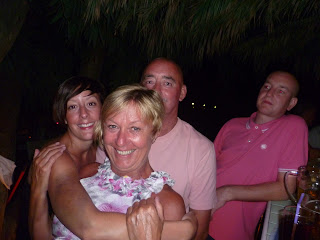Tuesday 20 September 2011, around 6.50 pm
We were on the decking, thinking about making supper, when Dave noticed the weather. Behind us to the West South West, clouds were scudding through the air. 'Look at those move,' Dave said, 'that's a lot of wind.' There was a huge bank of black clouds building up behind us against the mountain, and as we watched it formed into an enormous circle, about 200m across, a small but perfect tornado shape. The trees were whipping one way, and the clouds above another, and a wall of rain was defining the column. A noise like a heavy goods train was coming our way. I wish I'd got a photo, but probably better that I didn't - we darted into the van and waited for it to pass. It hit with tremendous force, but only lasted seconds and was gone - but the awning had collapsed again, trapping us inside.
This time, I was just able to squeeze out through the door, getting soaked in the process, and we struggled out onto the decking. The wires had held, but this time the struts had buckled. I held the awning up while Dave cut a piece of timber to fit, so we could at least get in and out.
Dave, obviously concerned, rang Pete: the phone rang out for several anxious seconds, but then was answered by an hysterical Rachel. The story we pieced together later was something like this:
The previous night, they'd been sheltering in a bay in Meganissey when the weather came through. After fighting to keep the boat off the rocks, Pete had given in and moved, around 4.30 am, over to Vlicho for safe anchorage. They'd slept late, and enjoyed the calm of the next day. They'd gone ashore in the afternoon and then got back to the boat about 6 ish for supper. The spaghetti had been boiled and a big pot of bolognaise just taken off the stove when the wind started to blow about force 5. They'd been expecting the forecast thunderstorm, so the cockpit was clear and all the hatches except the companionway were closed.
When the serious wind arrived (with no time for thought or preparation), Pete went topside and started the engine to motor towards the anchor and relieve the strain. He describes a wall of water which shortened visibility to less than half the boat length. Rain was lashing and the sea whipped up to a standing 2-3 metre wave. Out of this whiteness came another boat, clearly loose from its moorings, which smacked into Tropi's port side, riding high enough to leave antifoul traces on the toerail, and scraped from midships to stern, buckling stanchions, toerail, pushpit and gantry before disappearing behind. The impact must have broken the anchor chain, allowing Tropi to swing broadside to the wind, which laid her flat in the water, the top of the mast was submerged, the bolognaise redecorated the saloon, and Pete went overboard.
It was at this point that Edna gave her now legendary pep-talk: ‘Your Dad’s gone overboard. We’re all going to die.’
Pete - part miracle, part hero - swam ashore. Landing, gasping, on hands and knees in six inches of water on the flooded road, he found himself being angrily hooted by a Greek motorist in a 4x4 who couldn't get past. Luckily for the motorist Pete was out of breath at the time! Pulling himself together, our hero ran down the quay, watching for the boat, which was trailing 35m of anchor chain, which must have slowed her down sufficiently. Before she could go aground, Pete was back in the water, swimming out to her. Simon let down the ladder and brought him aboard. The weather had now passed, visibility was returning and the sea was calming down. But Pete wasn't finished. He'd swum past a catamaran that had been picked up and overturned by the wind: a woman was trapped inside and Ruairi from the yacht club was trying to get her out. Pete restarted Tropi's engine, put Simon on the helm, told him to motor in circles, grabbed a diving mask and leapt back into the water. Using the mask, Ruairi was able to break into the catamaran and bring out the woman. Pete then helped her out of the water before returning to Tropi.
We arrived on the quay in Vlicho about now, it was a complete devastation. Boats with shredded sails, snapped masts, sunken fishing boats, holes and gouges in every hull. As we drove past the boatyard where we winter Dave's boats we were shocked. Almost every boat had gone over, like dominos.
We made contact with Pete and arranged a berth on the Skorpios pontoon, bringing Tropi in on a lazy line as she had no anchor.
Some of the carnage in Vlicho boatyard - up close ...
... and the long view.
The unlucky catamaran. The owners, both in their 70s were on the last leg of a circumnavigation. You wouldn't expect to find the worst weather in the world in sheltered Vlicho Bay, would you?
If you want to get an idea of what went through Vlicho that Tuesday, try this link to YouTube. Its rather jerky camera work - taken from a balcony, but watch for the moment the wind changes and knocks all the bikes over. Tropi isn't visible, but she was out there, and watch for the ketch that is blown past at one point - it snapped all its land lines, but stayed attached to a concrete block mooring that weighed over 2,200 kilos.























